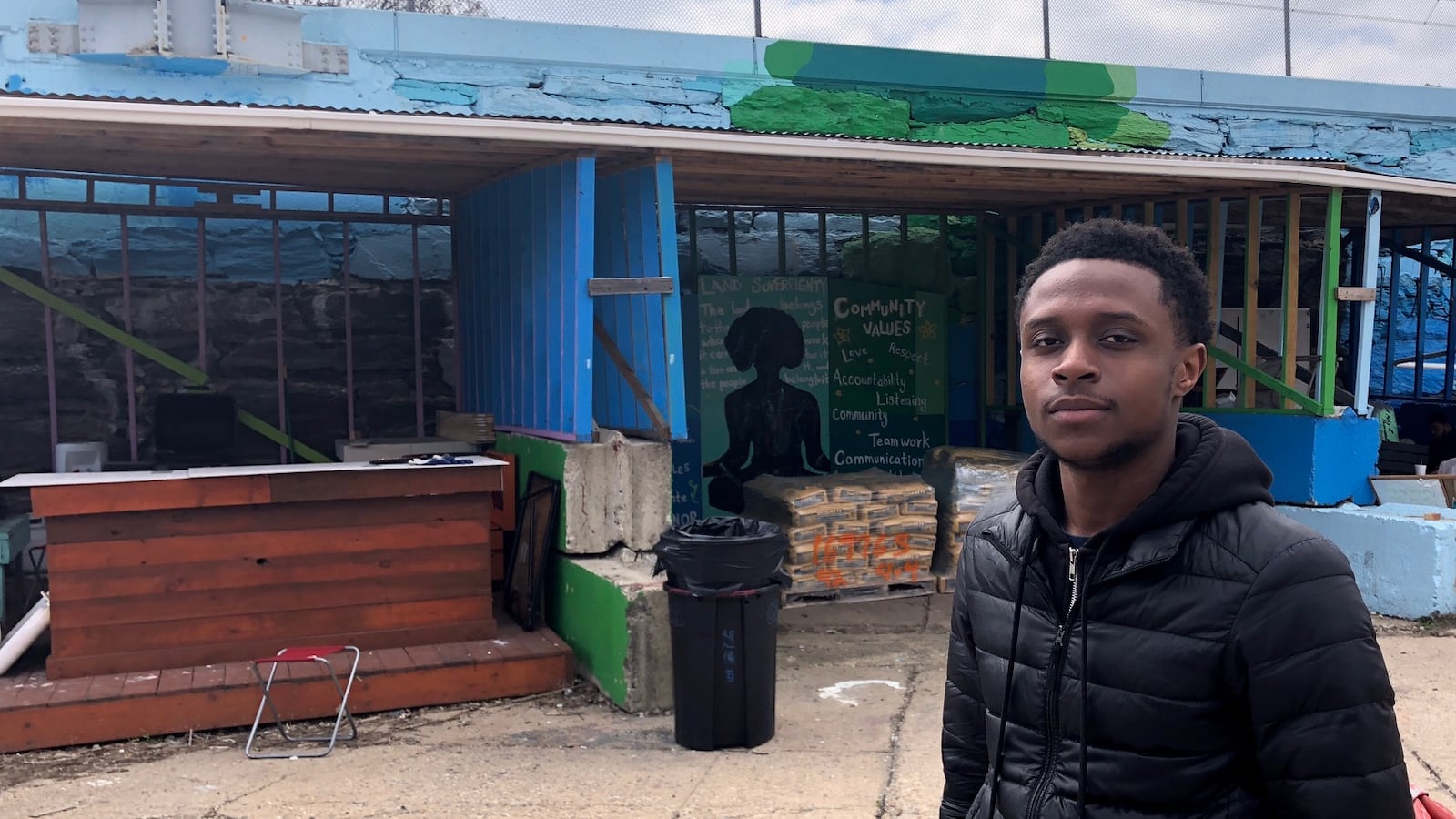This article was originally published in The Notebook. In August 2020, The Notebook became Chalkbeat Philadelphia.
Now that the weather is warmer, local community farmers and gardeners have prepared for the growing season. Soon, repurposed vacant lots and green spaces will bear vegetables and fruit for neighbors to enjoy.
In North Philadelphia, Urban Creators — a nonprofit food justice advocacy organization — operates Life Do Grow farm at Dakota and 11th Streets. Its summer youth program at the farm is in its early stages.
Toward the end of May, 30 young people between ages 14 and 21 arrived at the two-acre plot, ready to work. They’ll build fences and a hoophouse, plant and compost, and work within the community to provide healthy food options in what is considered a food desert.

Sweet potatoes, radishes, leafy greens, bell peppers, snap peas and blue corn are just some of the fresh produce that will be available.
“It’s a good project for the community we live in,” said Womp, a local resident who frequents the area to visit family and just gave one name. “And I hope they keep it going to teach the kids in the community a lesson on how to grow fresh vegetables.”
The program runs from late May until mid-August, from 7 a.m. to 1 p.m. Monday through Friday and every second Saturday of the month. Participants are paid $10 an hour. Funding comes from Philadelphia Youth Network as part of the WorkReady initiative, which partners with local organizations in the city to provide work experience to young people.
Sam Harris, 20, a graduate of Imhotep Institute Charter School, has been in the program since 2016 and will be a youth leader for this year’s summer participants. He is among half a dozen standouts from the previous summer who were invited to return in April for leadership training.
An assortment of leafy greens and herbs are produced at Life Do Grow farm.
Harris is studying business administration at Delaware County Community College and plans to become certified in carpentry after college. He said he wants to own a farm someday.
“By working here, it shows me how to do carpentry, plant, harvest, so I can actually apply that in the real world,” he said. “Those are all skills that every person should know how to do.”
Ammiel Townsend, 19, a Bodine High School graduate, started as a volunteer on the farm five years ago, then spent three summers in the youth program. The experience helped him land a staff position. He, too, would like to own his own farm and he is interested in food justice.
“People aren’t getting taught [about what is good for them] every day,” he said. “So we’re just stuck unless someone teaches and enables others. [The farm] is enabling others in this community.”
Young people in the program also learn about community-building and engagement by participating in Urban Creators’ free breakfast program, a free music festival called Hoodstock, and a farmers market. Early in the program, said Nyseem Smith, director of community engagement, those working in the program canvass the neighborhood, offering fresh produce to neighbors as an introduction.
“We want to get young folks to understand why we should be working together where we live and how our ancestors did it and why we should be building these relationships in our community,” said Stanley Morgan, farm manager.
In recent years, youths in the program have been exposed to the issue of land security, as Urban Creators and dozens of farms across the city are facing the threat that the land they occupy — often owned by city agencies or tax delinquents — will be sold to developers in a rapidly growing city.
Members of Soil Generation — a coalition of community farms, gardens, and organizations around the city that includes Urban Creators — is leading the fight for land security. They hold meetings and show up at City Council meetings, fighting for their cause.
Kirtrina Baxter, co-founder of Soil Generation and a member of Urban Creators, said, “It’s important for us to take our young through these processes” so they understand the political implications for their community. This is one way the youth program helps prepare the next generation of urban farmers.
“Farmers are aging out, and it is a really engaging field,” Baxter said. “It provides young people with a very grounded, holistic view of what the issues are in the community and how they can help themselves, their families, and their communities in a really meaningful, impactful way.”
The Notebook is one of 19 news organizations producing Broke in Philly, a collaborative reporting project on solutions to poverty and the city’s push toward economic justice. Read more at https://brokeinphilly.org and follow us on twitter @BrokeInPhilly
This article is part of a special online section of the Notebook that takes a look at school meals and the important role they play in providing nutrition to children in Philadelphia, the poorest among the 10 most populous U.S. cities. In Philadelphia, 26 percent of the population and 37 percent of children – that’s 126,000 children – live under the federal poverty line, according to Shared Prosperity Philadelphia.
Read more here.
The edition is made possible by the generous support of the Leo & Peggy Pierce Family Foundation.


